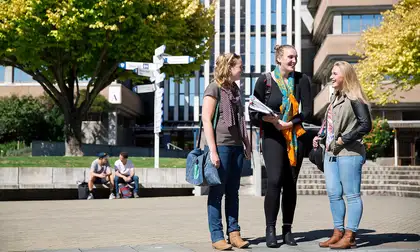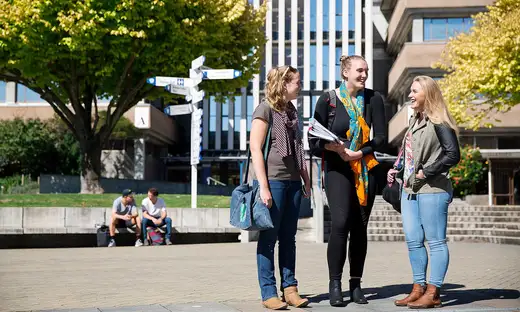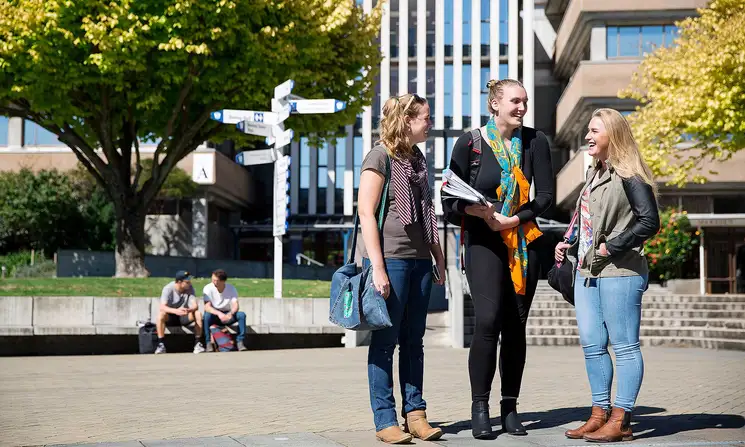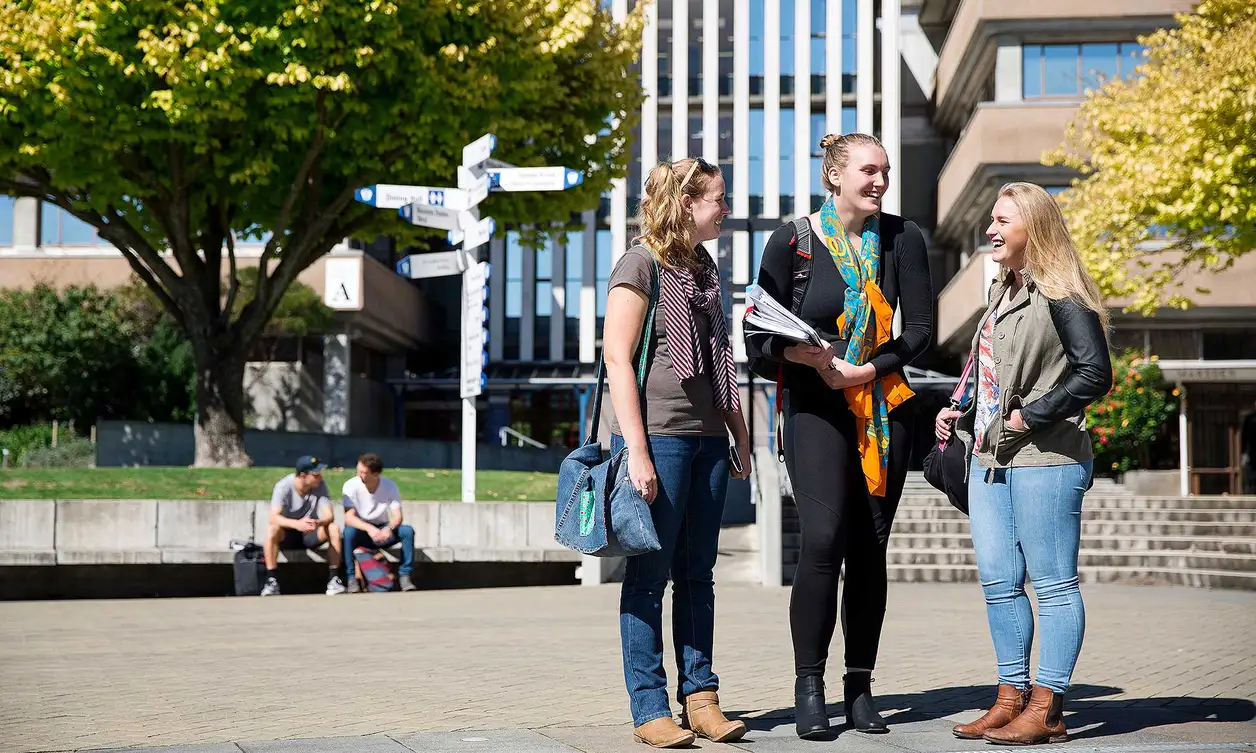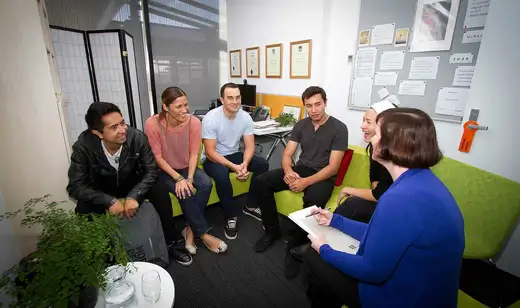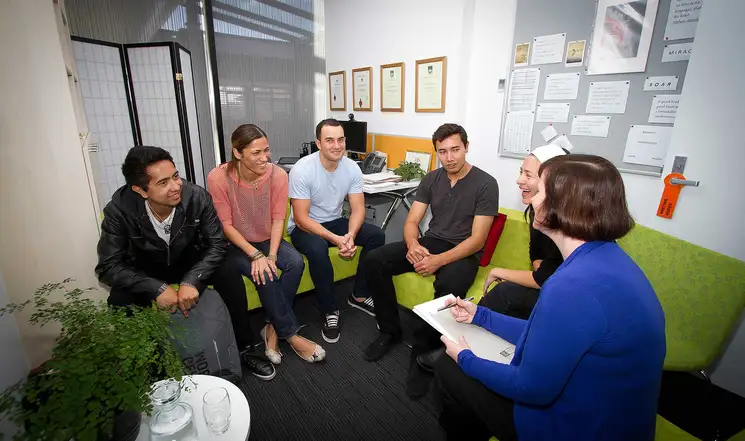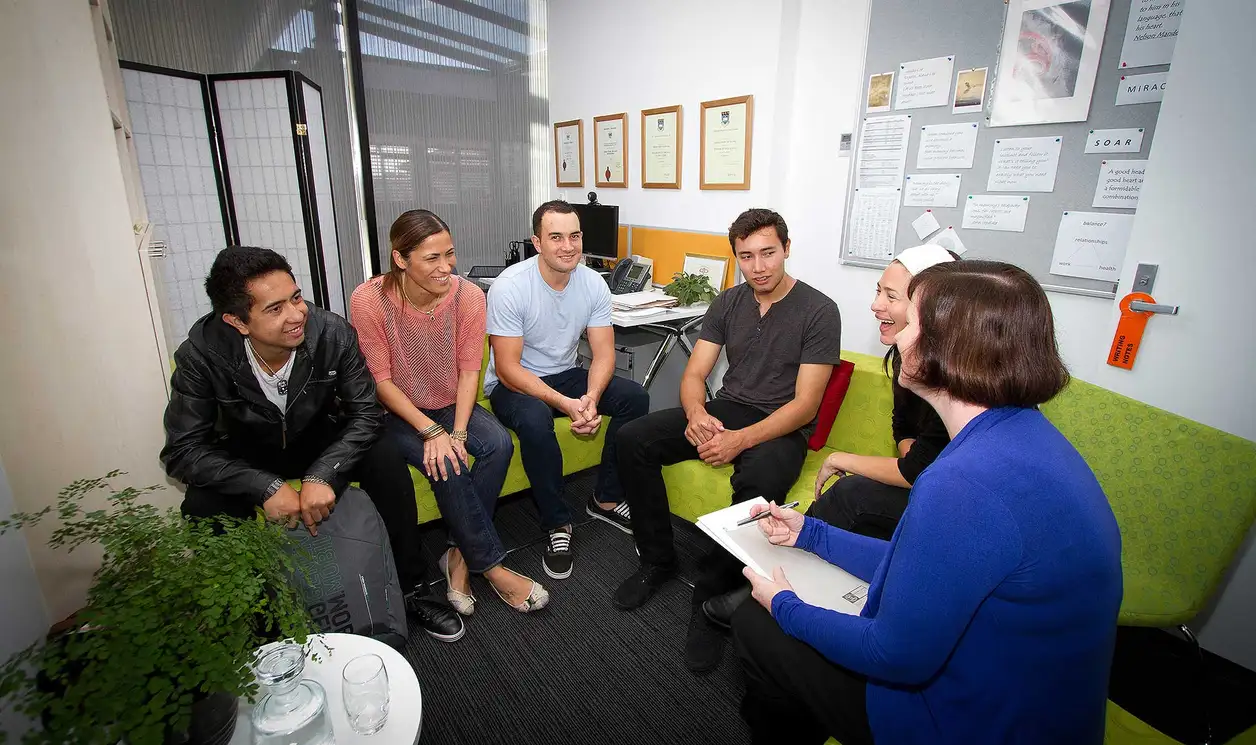On this page
- Passport and visa
- Medical and travel insurance
- Accommodation
- Enrolment
- Money and banking
- Travelling to New Zealand
- Arrival and orientation
- New Zealand culture
- Study and living costs
- Working in New Zealand
- Health and safety
- Graduation and returning home
- More information about living in New Zealand
- Contact International Student Support
- Related content
Moving to a new country to study is a big step. Depending on where you come from, New Zealand might be very different from what you are used to.
To help you settle in, we’ve put together a handbook with useful information about:
- how to access the Massey student systems
- how to pay your fees
- what to do in an earthquake
- commonly used words in New Zealand Aotearoa.
We recommend downloading and reading it before you arrive.
Passport and visa
International students need a valid visa to enter and study in New Zealand.
You need to show your passport and student visa to Campus Information Services – Mōhiohio so they can process your enrolment.
When you arrive, make sure you have a student visa showing your university, campus and qualification. If you need to change your visa, do this before the end of the first week of classes or you may not be able to study.
Medical and travel insurance
As a New Zealand student visa holder, you need to have medical and travel insurance. Once you arrive in New Zealand you need to pay for your healthcare costs, so having insurance is important.
Insurance for international students needs to cover visiting a doctor, treatment, prescriptions and everyday medicines, as well as emergency care. Check what your insurance covers before you go to the doctor. Your insurance may not cover things like dental care, contraception and vaccinations.
All international students at Massey are automatically covered by Studentsafe insurance.
Studentsafe insurance does not cover pre-existing conditions or family members. You need to apply for those separately.
Insurance for international students
Find out about paying for healthcare services from New Zealand Now
Accommodation
It’s wise to apply for your accommodation as soon as you can. Some accommodation options are very popular and fill up fast. Most students choose to arrange their accommodation through the Massey Accommodation Gateway.
Another option is homestay accommodation
If you are under 18 years of age, you need to live in accommodation that has been approved by Massey.
Read about accommodation at Massey
Enrolment
There are a number of things you need to sort out before you start at Massey.
Learn about enrolment, paying your fees and getting set up online
Money and banking
Some banks let you open a bank account before you arrive in New Zealand. They include:
If you open an account before you arrive, you will need to visit the bank once you get to New Zealand to activate your account.
When you open a New Zealand bank account, you need to give your overseas tax status and overseas tax identification number (TIN).
It’s wise to bring about NZD$500 in cash with you for transport from the airport, food and other things you need to buy when you arrive. It’s also a good idea to have a credit card.
Travelling to New Zealand
Book your flights well in advance to get the best chance of a good deal. Depending on what airport your international flight arrives at, you may need to book an onward flight to Wellington, Auckland or Palmerston North (where the Manawatū campus is).
If you will be living in campus accommodation at the Auckland or Manawatū campus, you can apply to be picked up from the airport when you arrive.
Before you fly, make sure you have the following in your hand luggage:
- your plane tickets
- a valid passport with a student visa to study at Massey
- copies of all the communications you have had with Massey – this could be your Receipt of Payment letter, Offer of Place, Accommodation Application and Arrival Form
- money to pay the NZD$35 International Visitor and Tourism Conservation Levy when you arrive in New Zealand
- at least $500 in cash in New Zealand currency
- contact details for the International Student Support staff at your campus
- clothes for the weather in New Zealand when you arrive
- laptop, tablet, mobile phone and charger
- electrical plug or adaptor for New Zealand
- medication – you need to check whether you can bring this to New Zealand. You may need a prescription or letter from your doctor.
Arrival and orientation
It’s best to arrive on campus at least two days before the campus orientation begins.
Contact the International Office if you will not be able to start studying on the date stated on your Offer of Place. You can send an email to international@massey.ac.nz.
If you are studying a pre-degree or foundation qualification or an English language course, let us know your arrival date in advance.
If you are a doctoral or English Language student, your study may start and finish on different dates from other qualifications.
New Zealand culture
New Zealand culture may be very different from what you are used to. There are some important things to be aware of before you come here.
Culture shock
Studying overseas is a big change, and things that were easy for you in your home country can be unfamiliar in a new culture. You might experience culture shock while you are in New Zealand. This can include feelings of:
- surprise
- uncertainty
- confusion
- frustration
- loneliness
- lack of control.
Most international students experience culture shock. Although it can be unpleasant, it is very normal and it tends to get easier with time.
If you’re struggling, you can contact the Student Care team at studentcare@massey.ac.nz.
Culturally appropriate behaviour
New Zealand has a relaxed, friendly lifestyle, but New Zealanders may think some things you are used to doing are not polite.
An example of this could be pushing in front of someone who was waiting before you if that is normal in your culture.
You can read about what New Zealanders are like in the ‘Settling in New Zealand’ section of the International Student Support handbook.
Study and living costs
The amount of money you need to live and study in New Zealand may be different from what it would be in your home country.
Cost of living
If you are a degree student, you need to be able to show you have NZD$20,000 to cover living costs for a year plus NZD$1,500 for a return airfare to get a student visa. It’s also a good idea to have an emergency fund for unexpected expenses.
For students from many countries, the exchange rate to New Zealand dollars is favourable. But you may be surprised by the cost of things like food and rent in New Zealand. Some regions or cities are cheaper to live in than others, for example rent tends to be cheaper in Palmerston North than Auckland or Wellington.
You can work out how much everyday expenses such as accommodation, power, food and transport are likely to cost by using StudyLink’s cost of living calculator.
You can also find out about average rents across New Zealand from New Zealand Now.
If you bring your family with you, think about how you will support them. Your partner may not be able to get a job that covers or helps with family costs.
In New Zealand, children’s schooling is free but textbooks, school activities, sports and uniforms are not.
Transport
If you are a full-time student, you can get a public transport concession or free public transport depending on your campus.
Download a campus map and find out how to get to your campus
If you have a driver’s licence from your home country you may be able to drive in New Zealand. But be aware that buying and running a car can be expensive here.
Find out about driving from the New Zealand Transport Agency
Fees
Your tuition fees differ according to the degree or qualification you are studying towards. You need to pay your fees before you start studying.
If you are a doctoral student, you pay the same tuition fees as New Zealand domestic students.
International student tuition fees
There are also non tuition fees you need to pay.
Financial assistance and scholarships
A range of scholarships and financial assistance packages is open to international students studying at Massey.
Scholarships and financial aid for international students
Financial aid for Canadian students
Working in New Zealand
Most international students are allowed to work part-time during their studies. You may also be able to get a post-study work visa when you finish studying.
Working during your studies
If you are studying towards a full degree for at least one year, you can work:
- up to 20 hours each week during the university semesters
- up to 40 hours each week during breaks.
You need an Inland Revenue Department (IRD) number if you want to get a job.
Learn about getting an IRD number
Your student visa will usually say if you are allowed to work. But if it does not say or you think you can work, contact the visa team at visa@massey.ac.nz to ask for a variation of conditions. You might also be able to get a variation of conditions if you need to work as part of your degree.
If your partner is coming to New Zealand with you, they can apply for a work visa for the same time period as your student visa.
See more about getting a variation of conditions (VOC)
Learn about working on a student visa from Immigration New Zealand
Find out about employment rights and wages from Employment New Zealand
Working after your studies
You may have the option of working in New Zealand after you finish your studies. Immigration New Zealand offers a post-study work visa for students who have successfully completed an acceptable qualification at a New Zealand university.
Learn about the post-study work visa from Immigration New Zealand
Massey’s Career Centre is a great resource to use in your job search. It offers online courses on things like interview preparation and how to write cover letters and CVs.
Health and safety
We want you to stay safe during your time in New Zealand.
Outdoor activities
New Zealand has higher ultraviolet (UV) levels than many other countries and some of the highest rates of skin cancer in the world. Cover up with:
- sunscreen
- a hat
- clothing that protects you from the sun.
This is especially important between 10am and 4pm and in the warmer months from September to April.
If you decide to go on an outdoor trip, make sure you plan your route and how long you expect to take. Then tell someone or leave your plans with a friend. You can find trip details at the local iSite office or on the iSite website.
New Zealand weather can change very quickly so make sure you check the weather forecast and prepare for change.
Earthquakes
Depending on where you study, you may experience earthquakes during your time in New Zealand. Make sure you know what to do if the ground or the building you are in begins to shake.
Find out what to do in an earthquake from Get Ready New Zealand
Alcohol, drugs and tobacco
If you are 18 or over, you can buy alcohol and tobacco in New Zealand.
If you are drinking, stay with your friends and look out for each other. It’s a good idea if one of you stays sober or only has a few drinks. Share a taxi home rather than trying to walk.
Learn about New Zealand drug and alcohol laws
Road safety
In New Zealand, cars drive on the left. Make sure you cross the street at pedestrian crossings and look both ways before you cross.
If you decide to cycle, wear a helmet and make sure you are visible to drivers by putting lights on your bike and wearing high visibility gear.
Health and support services
There are services in New Zealand that can help you with anything from legal advice to mental health issues. The services directory in the International Student Support handbook lists the contact details of a wide range of support services.
Massey offers free counselling services to students living in New Zealand.
See more about counselling and mental health support
All support services Massey offers to students
Learn about healthcare in New Zealand from NauMai NZ
Graduation and returning home
Once you have completed your qualification, make sure you apply to graduate.
Staying in New Zealand until you graduate
You might decide to stay in New Zealand, travel or work until you graduate, and then return home.
If you choose to do this, you need to extend your travel and medical insurance to cover the full length of your student visa. The Studentsafe policy only covers you for 31 days after the last day of exams.
You also need to apply for a visitor visa to cover the period between your student visa’s expiry date and your graduation date.
Find out about visitor visas from Immigration New Zealand
Things to do before you return home
Depending on your living situation, before you leave New Zealand you might need to:
- give notice to your landlord
- cancel your electricity and phone plan
- pay any outstanding bills or fines
- return any library books
- arrange for your rental bond to be refunded to you
- clean your accommodation before you leave
- sell or donate any furniture or appliances you don’t want to take with you, for example by listing them on Trade Me or taking them to a secondhand shop
- let the New Zealand Transport Agency know if you have sold your car, and cancel your insurance policy
- close your New Zealand bank account and arrange to send your money to your account back home
- get cash out in your home currency to take with you when you travel
- change your contact details with Massey.
Reverse culture shock
During your time in New Zealand, you will have adapted to a new culture and may have changed more than you realise. It can be just as hard re-adjusting to life in your home country as it was coming to New Zealand but it does get better with time.
More information about living in New Zealand
The following New Zealand government sites also have useful information about topics like working while you study, the cost of living and New Zealand culture:
And if you haven’t already downloaded the International Student Support handbook, you can do that here:
Contact International Student Support
If you are struggling with welfare issues, contact the Student Care team at studentcare@massey.ac.nz.
For questions about visas contact visa@massey.ac.nz.
For all other questions, contact Student Registry at international@massey.ac.nz.
